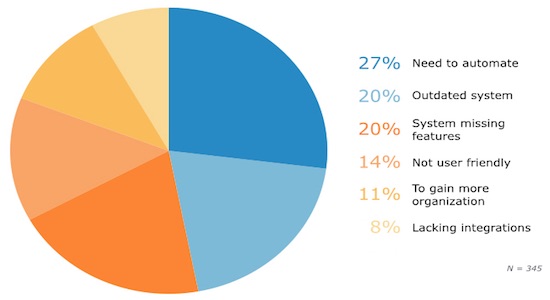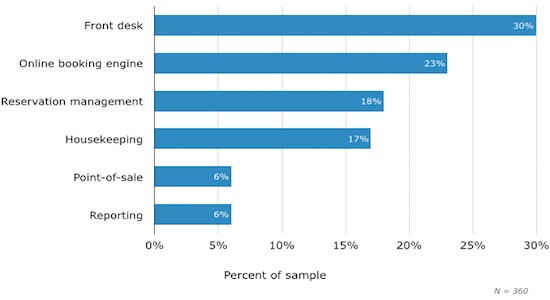
Trends in the purchase of hotel technology show a shift to cloud systems
By cameron in Uncategorized
Improvements in hotel technology have been enabling properties to think less about the behind the scenes processes and concentrate more on guests.
Two years ago about a quarter of US hotels were using pen and paper to manage their properties but, fast forward to 2017 and they are looking increasingly to cloud-based systems to improve processes.
NB: This is research from purchasing advice company Software Advice.
In its latest report, the company says 96% of hotel software buyers are now looking for a cloud-based system because it means lower investment costs and more flexibility, especially for independent hotels.
The ‘Hotel Management Buyer Report – 2017’ looks at current hotel management software buyer behavior.
It also identifies the most popular software functionality most hotels use to attract guests, facilitate direct bookings and improve the guest experience.
Key findings
The use of a hotel-specific system is increasing alongside modest industry growth—hotel management system adoption increased by 2% in the past two years.
Sixty-two percent of buyers are looking to replace problematic software, while 38% are new users looking to automate and increase organization.
Hotels are almost entirely in the cloud—96% of HMS buyers opt for web-based deployment.
US hospitality industry growth boosts hotel management system HMS Adoption
Hospitality companies use a wide array of methods to handle daily tasks, such as taking reservations, checking guests in and out and tracking housekeeping.
As the industry continues to see modest growth in supply and demand in 2017, we see that the adoption of a hotel-specific management system has increased by 2 percent from two years ago.
At the same time, there’s a 2% decrease of manual methods, which include pen and paper or spreadsheets.
This suggests that more hospitality companies recognize the benefits of a hotel-specific property management system.
These systems offer features crucial to hospitality. As a hotel manager, your standard PMS addresses the needs of apartment or condo managers; an HMS includes functionality that you need to stand out from the competition, including:
- Reservation management
- Revenue management
- Channel management
- Guest relationship management
- Point-of-sale
An HMS serves as an all-in-one system. HMS users don’t have to click around different windows or log-in and out of different programs because these systems integrate all systems into one, seamless experience.
For HMS seekers, a combined 62% cite specific problems with the software—it’s old, it lacks features or it’s hard to use—as their reason for shopping around. Another 27% are just starting out and want a new system to help them stay organized from the beginning.

We also looked at the applications buyers request most to find out their must-have functionality. Front desk applications, unsurprisingly, ranked first; every hotel needs proper front desk capabilities to check guests in and out and generating key cards.
Beyond the basics, buyers need to make sure their hotel has an online presence that can attract guests who can book directly from the hotel’s website. It’s no surprise, then, that an online booking engine was a close second at 23%.

The facts are undeniable: about 148 million travel bookings are made online each year. That’s 57% of all travel reservations made in a year.
Even more importantly, 65% of same-day reservations are made on a smartphone.
As travelers consistently and increasingly perform research and book online, your goal should be to use an online booking engine to get your property in front of them as soon and often as possible during their selection journey.
An online booking engine also offers other useful capabilities:
- Customization and branding. Most OBE vendors allow hotels to embed the engine within a branded landing page, so guests stay engaged with your specific logos and themes throughout the booking experience.
- Image gallery. In addition to logos, hotels can also insert professional photos and galleries into the page to show off your rooms and amenities.
- Real time pricing and inventory. The rates and availability of rooms are pulled from the HMS directly, minimizing double bookings or other guest inconveniences.
The full report can be seen here.
NB: This is research from purchasing advice company, Software Advice. A version of this article originally appeared on Hotelspeak.
NB2: Hotel front desk image via BigStock.
![]()

